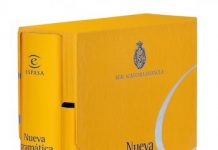Spain Invoked by John Liddy.
Ireland had for centuries looked to Spain for military and spiritual aid against the common enemy, England, and many poems exist to verify that plea for help. Roisin Dubh (Little Black Rose), a folk poem possible from the 1600s, is one of Ireland’s most famous political songs. It is based on an older love-lyric in which the title referred to the poet’s beloved rather than, as here, being a pseudonym for Ireland: Roisin, have no sorrow for all that has happened to you/the friars are out on the brine, they are travelling the sea,/your pardon from the Pope will come, from Rome in the East,/and we won’t spare the Spanish wine for my Roisin Dubh.
After the battle of Kinsale (1601), which lead to the defeat of the Irish forces, despite the help of 3,000 soldiers sent from Spain, the confiscation of their lands and the beginning of enforced exile, another poem, written over a century later, laments the loss of a great house and its people, near Clonmel, Co. Tipperary: Cill Chais (Kilcash): Now what will we do for timber/with the last of the woods laid low?/There’s no talk of Kilcash or its household and its bell will be struck no more…And it goes on… Then a climax to all of our misery,/the prince of the Gael is abroad/overseas with that maiden of mildness/who found honour in France and Spain…
And yet again in a poem by Eoghan Rua O Suilleabhain (1748-1874), the plea for Spanish aid is also found in A Magic Mist: If our Stuart returned o’er the Ocean/to the lands of Inis Ailge in full course/with a fleet of Louis’ men, and the Spaniards,/by dint of joy truly I’d be/on a prancing pure steed of swift mettle. And still later, the hope that Spain will come to Ireland’s aid is beautifully invoked in Dark Rosaleen, a version by James Clarence Mangan (1803-49): O my Dark Roseelen,/Do not sigh, do not weep!/The priests are on the ocean green,/They march along the deep./There’s wine…from the royal Pope, Upon the ocean green;/And Spanish ale shall give you hope,/My Dark Rosaleen!/My own Rosaleen!/Shall glad your heart, shall give you hope,/My Dark Rosaleen!/My own Rosaleen!/Shall glad your heart, shall give you hope,/Shall give you health, and help, and hope,/My Dark Rosaleen.
The Modern Tide
The poet Seamus Heaney (1939-2013) on being awarded Hororis Causa by the Universidade da Coruña in 2000 spoke about Finsterre looked at from Ireland and that Galicia, to some extent, is the first land in our poetic imagination, since legend tells us that the first poet of the Irish tradition was one who arrived from this part of Spain. He went on to explain that according to the twelfth century Leabhar Gabhála or Book of Invasions, his name was Amergin (9th century?) and he is credited with being one of our first poets, although there were other anonymous and credited poets writing before Amergin’s arrival.
In contemporary times, an Irish poet associated with Galicia is Pearse Hutchinson, who also forged strong links with Cataluña. The poet Michael Smith translated numerous Spanish language poets such as Francisco de Quevedo, Luis de Góngora, Gerado Diego, Pablo Neruda and Vicente Huidobro. He also published the selected poems of Rosalia de Castro, The Prison Poems of Miguel Hernández and, with Luis Ingelmo, Complete Poems of Claudio Rodriquez and Complete Poems of Gustavo Adolfo Bécquer. Together with the Peruvian academic Valentín Gianuzzi he translated and published the Complete Poetry of César Vallejo, in four volumes. In collaboration with Beatriz Villacañas he translated a selection of poems by Juan Antonio Villacañas.
Other poets worth mentioning are Michael Hartnett, who published translations of Lorca (Gypsy Ballads) and during the Spanish Civil War the poet Charlie Donnelly died in the fields of Jarama outside Madrid. Ewart Milne was another poet who took part in that catastrophic war. The poems of Caitlín Maude, Mary O’Malley and Desmond Egan are also deserving of mention as they have had studies of their work published in Spain, along with translations in Spanish. There are others of worthy mention but space does not permit my doing so. Nevertheless, these poets are part of my own connection with Spain.
Today
The Spanish Cultural Institute of Dublin under the direction of José Antonio Sierra, was and is a pioneering influence in fostering cultural links between Ireland and Spain, the only cultural body to do so since its formal opening in 1974. It is now the Cervantes Institute, since 1992.
The SCI of Dublin continues to advocate for closer links between our two poetic traditions. To underline this point the correspondence I have seen between the Irish poet Theo Dorgan, representing Poetry Ireland, and José Antonio, bears witness to his dedication in the 90s to the furtherance of our poetic traditions. That correspondence is relevant today as it reveals a plan of work concerning the possibility of exchange readings with the involvement of The Irish Writers’ Union, Poetry Ireland, the respective Embassies and Arts organisations of our two countries. Publications of works could also be considered in the Irish, English and Spanish languages, to include Gallego, Euskara and Catalán.
In 2008 the Cervantes Institute in Dublin organised a Poetry in dialogue Ireland and Spain event with poets from our two countries reading their poems. That kind of collaboration, along with the work of The Spanish Cultural Institute of Dublin, reminded me of The Well Festival here in Madrid (2004-2010) organised by my brother and I with financial support from Matthew Loughney of The James Joyce Pub, a few generous friends, the Irish Embassy Madrid and Literature Ireland. We believed in strengthening links by reminding ‘those who drink from the well, should never forget those who dug it’.
Poetry is one of the best ways I know of going to the well and sharing the elixir vitae, in the sense of mutual enrichment.
______________________________________________________________________
John Liddy, born Youghal, County Cork, grew up in Limerick, took a degree with The University of Wales, lives in Madrid where he worked as a Teacher/Librarian. Between the publication of Boundaries (1974) and Arias of Consolation (2021/22) he has published twelve poetry books, a collection of stories for children Cuentos Cortos en Ingles: Los Sonidos de los Vocales (2011); edited with Dominic Taylor 1916-2016 An Anthology of Reactions and 1919-2019 An Anthology Commemorating the Limerick Soviet 1919 Let Us Rise. Liddy has also translated poems to and from English, Irish, Spanish and edited a special edition of Vietnamese poets for The Café Review. He is currently editing a special issue of Irish language poets to appear with poets from Macao, China for The Hong Kong Review, of which he is a board member. He has recently completed a collection of short stories with his brother Liam and is awaiting publication of Slipstreaming in the West of Ireland, cowritten with Jim Burke, and Spanish Points, a collection of all his Spain-related poems.


